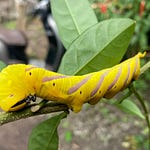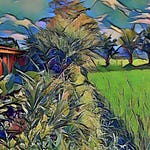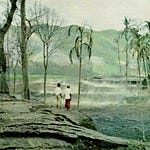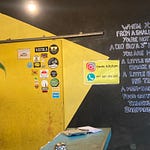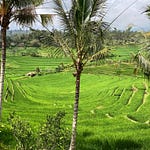“... But this was the centre of a broad boulevard, and at the side of the boulevard was a line of cafes and small shops, all brightly lit, all open, and all utterly silent and empty beneath a sky thick with stars. The hot night was laden with the scent of flowers and with the salt smell of the sea.
Will looked around carefully. Behind him the full moon shone down over a distant prospect of great green hills, and on the slopes at the foot of the hills there were houses with rich gardens and an open parkland with groves of trees and the white gleam of a classical temple.”
So writes Philip Pullman in The Subtle Knife, the second book of his series His Dark Materials. I’m rereading the series at the moment for a side-project.
Me reading His Dark Materials for the first time. Photo: Samantha Brown.
I’ve written before about colour and how travelling in Southeast Asia helped me to better understand it. The beauty and memorability of it might come with a smog assist, but regardless, that four in the afternoon light can be magnificent. The region’s smells and aromas though, outside of food writing, don’t get much of a mention.
Re-read the two paragraphs I lead with, they run one after the other in the text. The first, with the flowers and salt air, creates the image far more than the second, despite the latter being more descriptive.
Dinner cooking (very slowly!), sand, cut grass, french fries, beer, wine, salt air, something burning from afar, sea shells. Photo: Stuart McDonald.
Smell is hard-wired into our brain. That waft of wet market aroma so thick you could slice it, takes a nerve highway through the olfactory bulb into our limbic system. There, the amygdala and hippocampus, our emotional and memory engine rooms, boil them up and file them away. This is one of the reasons why a smell you can’t quite place often triggers déjà vu.
Combine smell and taste, as we do on average three times a day (or more!) and you’ve got a veritable memory bank of experiences seared into that noodle inside your skull.
And yet, outside of food, smell doesn’t break the surface in much travel writing. In food writing it is unavoidable, smell and taste are the experiences. Elsewhere, only say in a wet market, by a piggery, or within the single loo at Cheap Charlies, where it is so obvious you can’t not mention it, does it see some column inches.
Dried fish, a hint of fish scales, salt air with a petroleum chaser. Photo: Stuart McDonald.
Part of the reason for this is that smell is a hard sense to write about. When I lived in Bangkok, our place was on a side-soi off of Sukhumvit Soi 27. About a ten minute walk away was Soi 33, the Painters’ Soi. So named for all the bars named after painters—or was it that the near-universally male clientele got painted there? Regardless of paint jobs, as I walked past the mouth of the soi most days, it had a unique smell—the Soi 33 smell. I couldn’t begin to describe it, but I’d know it immediately if I smelt it.
See, I told you it is hard to write about.
One of the reasons smell is so personal is that it is the only fully-developed sense a fetus has in the womb. The sense remains our strongest until around age ten when eyesight takes over. This ten-year stretch is a formative one of creation, laying a foundation of smells you like and hate. If I’d had a chunk of my early years in Thailand and Malaysia rather than Japan and South Korea, perhaps I’d be better with durian.
Charcoal, coconut husks, oil, fish scales, cut grass, sea breeze and sunscreen. Photo: Stuart McDonald.
So it is hard to write about, and it is personal. What somewhere smells like to me isn’t what it smells like to you. Get five complete strangers and give them each a ripe durian—or stand then at the mouth of Soi 33—and have them describe it. Good luck with the similarity count.
All the senses are, at their core, subjective. I like walking on sand barefoot, so much so the type of sand grain matters to me. The feeling of the sand on my skin, the sound of it sliding around my toes, and yes, the smell of the salt air—and the sand.
Yet others can’t bear to walk on sand barefoot. When a friend suggested the squelching sand sound was like fingernails down a blackboard, I thought she was joking. She wasn’t, somehow we’re still friends. By the way, the best sand for walking on in Southeast Asia is at Bali’s Balangan Beach. Yes, I will die on this hill.
Oil, grease, drying paint, seashells, sweat, salt, coconuts, beer, and seawater. Photo: Stuart McDonald.
I’ve written about squelchy sand and perfect round sand grains near a million times. The smell of the sand though, when you lift a fistful of the wet stuff to your face and inhale it? Not so much—never in fact. Yet it can be an amazing olfactory experience. There’s the grains, the water that washes over them, that fish or seaweed background. See, I told you smell is hard to explain.
The one time I do write about smell quite a lot is not in relation to smell at all. Regular readers will have encountered me writing “slow down and smell the coffee,” but I’m not writing about the coffee or its smell. Rather it’s a throwaway line to suggest people slow down, so they’ll have time to smell the coffee. Thinking about it, it is a stupid thing to say, because what is there to write about coffee smells?
What does it smell like to you? What’s a smell that says Southeast Asia to you?
Couchfish is 100 per cent independent and reader-supported. If you’re not already a subscriber, and you’d like to show your support, become a paying subscriber today for just US$7 per month—you can find out more about Couchfish here—or simply share this story with a friend.
Don’t forget, you can find the free podcasts on Apple, Pocket Casts and Spotify as well as right here on Couchfish.








